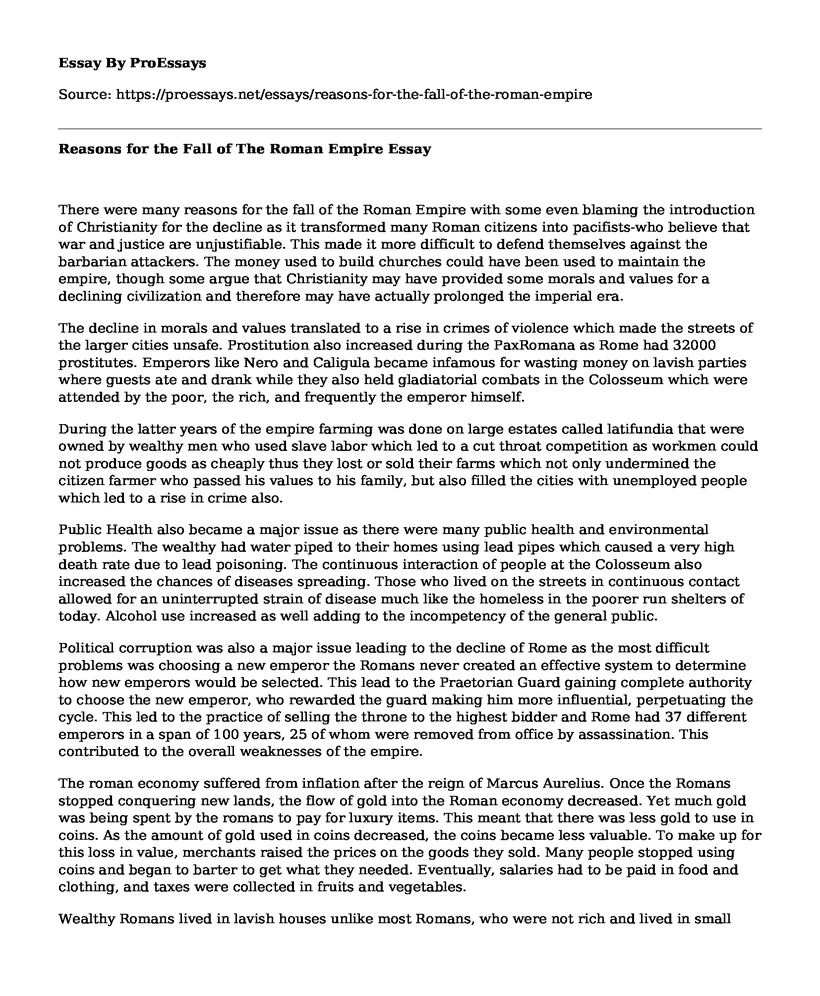There were many reasons for the fall of the Roman Empire with some even blaming the introduction of Christianity for the decline as it transformed many Roman citizens into pacifists-who believe that war and justice are unjustifiable. This made it more difficult to defend themselves against the barbarian attackers. The money used to build churches could have been used to maintain the empire, though some argue that Christianity may have provided some morals and values for a declining civilization and therefore may have actually prolonged the imperial era.
The decline in morals and values translated to a rise in crimes of violence which made the streets of the larger cities unsafe. Prostitution also increased during the PaxRomana as Rome had 32000 prostitutes. Emperors like Nero and Caligula became infamous for wasting money on lavish parties where guests ate and drank while they also held gladiatorial combats in the Colosseum which were attended by the poor, the rich, and frequently the emperor himself.
During the latter years of the empire farming was done on large estates called latifundia that were owned by wealthy men who used slave labor which led to a cut throat competition as workmen could not produce goods as cheaply thus they lost or sold their farms which not only undermined the citizen farmer who passed his values to his family, but also filled the cities with unemployed people which led to a rise in crime also.
Public Health also became a major issue as there were many public health and environmental problems. The wealthy had water piped to their homes using lead pipes which caused a very high death rate due to lead poisoning. The continuous interaction of people at the Colosseum also increased the chances of diseases spreading. Those who lived on the streets in continuous contact allowed for an uninterrupted strain of disease much like the homeless in the poorer run shelters of today. Alcohol use increased as well adding to the incompetency of the general public.
Political corruption was also a major issue leading to the decline of Rome as the most difficult problems was choosing a new emperor the Romans never created an effective system to determine how new emperors would be selected. This lead to the Praetorian Guard gaining complete authority to choose the new emperor, who rewarded the guard making him more influential, perpetuating the cycle. This led to the practice of selling the throne to the highest bidder and Rome had 37 different emperors in a span of 100 years, 25 of whom were removed from office by assassination. This contributed to the overall weaknesses of the empire.
The roman economy suffered from inflation after the reign of Marcus Aurelius. Once the Romans stopped conquering new lands, the flow of gold into the Roman economy decreased. Yet much gold was being spent by the romans to pay for luxury items. This meant that there was less gold to use in coins. As the amount of gold used in coins decreased, the coins became less valuable. To make up for this loss in value, merchants raised the prices on the goods they sold. Many people stopped using coins and began to barter to get what they needed. Eventually, salaries had to be paid in food and clothing, and taxes were collected in fruits and vegetables.
Wealthy Romans lived in lavish houses unlike most Romans, who were not rich and lived in small smelly apartments with six or more stories called islands which covered an entire block. First-floor apartments were for the rich and rented for about $100 a year. The more shaky wooden stairs a family had to climb, the cheaper the rent became roughly $40 a year and they were hot, dirty, crowed, and dangerous. Anyone who could not pay the rent was forced to move out and live on the crime-infested streets making the cities decay.
During the last 400 years of the empire, the scientific achievements of the Romans were limited almost entirely to engineering and the organization of public services. But since the Romans relied so much on human and animal labor, they failed to invent many new machines or find new technology to produce goods more efficiently. They could not provide enough goods for their growing population. They were no longer conquering other civilizations and adapting their technology, they were actually losing territory they could no longer maintain with their legions.
Maintaining an army to defend the border of the Empire from barbarian attacks was a constant drain on the government, spending left few resources for other vital activities such as providing public housing and maintaining quality roads and aqueducts. Frustrated Romans lost their desire to defend the Empire meaning they had to begin hiring soldiers recruited from the unemployed city mobs or worse from foreign counties. These were unreliable and very expensive forcing the emperors to raise taxes frequently leading to increased inflation.
Cite this page
Reasons for the Fall of The Roman Empire. (2021, Mar 23). Retrieved from https://proessays.net/essays/reasons-for-the-fall-of-the-roman-empire
If you are the original author of this essay and no longer wish to have it published on the ProEssays website, please click below to request its removal:
- Cold War and Nuclear Arms Race Essay
- Essay Example on El Chapo Trial: Mexico's Drug War Spectacle
- Essay Example on Ancient Egyptians: Quarrying & Technologies Behind the Pyramids
- Essay Example on Alex & Shirley: A Tale of Family & Strength
- Kelly's Struggles With Cultural Diversity in Japan - Essay Sample
- Essay Example on Oklahoma: A History of Cultural Diversity & Inclusion
- Slavery - Free Essay Sample







